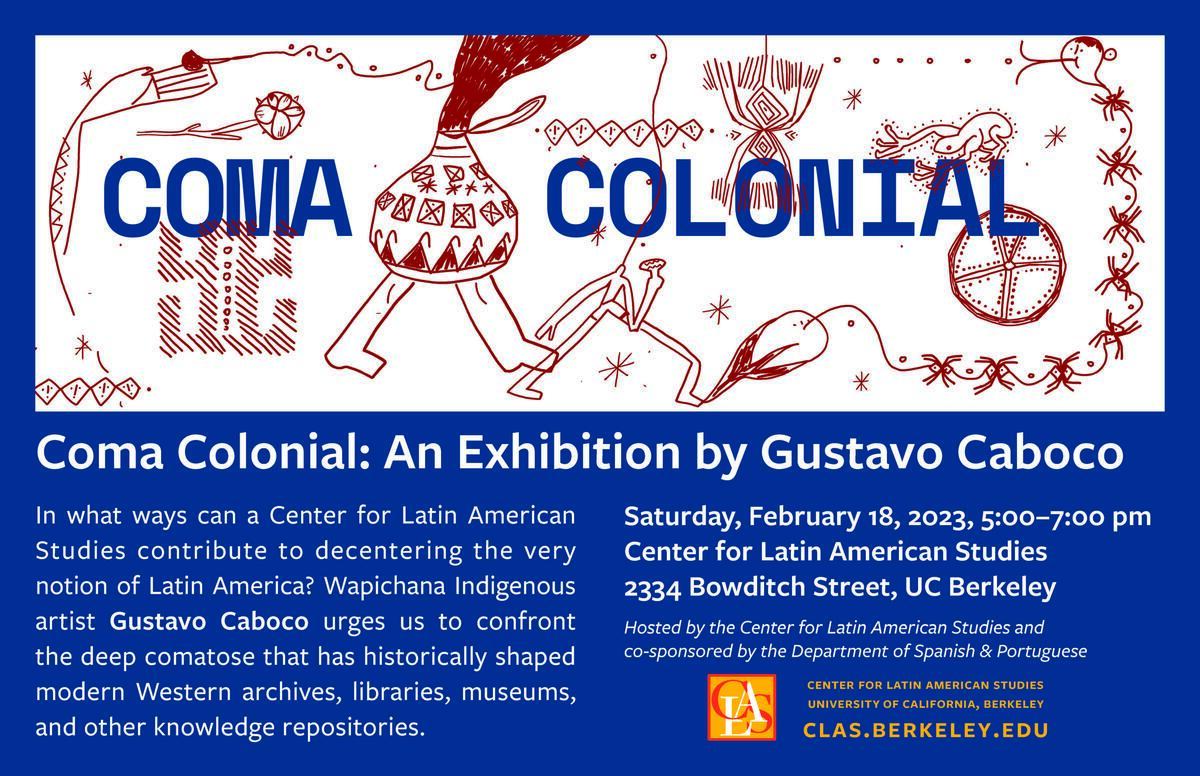In what ways can a Center for Latin American Studies contribute to decentering the very notion of Latin America? To what extent can often overlooked sensemaking practices be centered in a Center for Latin American Studies? How much can margins take center stage? Wapichana Indigenous artist Gustavo Caboco welcomes us to experience the Center for Latin American Studies at UC Berkeley as a site of critical inquiry and aesthetic practice, not as an enclosed space to be taken for granted but as a fertile soil for conjuring alternate itineraries, vocabularies, and belongings.
Introducing his exhibition Coma Colonial at CLAS, he urges us to confront the deep comatose that has historically shaped modern Western archives, libraries, museums, and other knowledge repositories. Gustavo Caboco's practice extends across embroidery, film, installations, paintings, and performances. In dialogue with Naine Terena, Natalia Brizuela, and Jamille Pinheiro Dias, he invites the Berkeley community to engage with Coma Colonial.
Speakers
Gustavo Caboco is an Indigenous artist from the Wapichana people in Brazil. He is the son of Lucilene, a Wapichana woman who was separated from her people in the Canauanim community, in Cantá, in the state of Roraima, in the Brazilian Amazon, near the border with Guyana. He was born and raised in Curitiba, in southern Brazil, where his mother settled after successive adoptions. His investigation centers around what he refers to as a "return to the land" and translates into drawings, paintings, embroidery, animation, video, and performance. "Returning to the land", though, does not mean simply going back to Roraima; it means connecting dots that are seemingly invisible. In his works, bodies are twisted, split, and turned into different parts, while also standing upside down, rooted on earth. Caboco critically engages with archives and museum collections that portray Indigenous peoples, exposing exotifying stereotypes and racist approaches in visual narratives. He participated in the 34th Bienal de São Paulo with a variety of works, and was a PIPA Prize 2022 nominee. Also in 2022, he joined the Indigenous-led arts gathering aabaakwad at the 59th Venice Biennale.
For more information, see https://caboco.tv
Jamille Pinheiro Dias was born in Belém, in the Brazilian Amazon, in 1983. She is currently a von der Heyden Fellow at Duke University's Amazon Lab, and a lecturer in Environmental Humanities at the University of London. She was previously a research associate at the University of Manchester, where she worked on the Cultures of Anti-Racism in Latin America project, and a visiting researcher in Iberian and Latin American Cultures at Stanford University. Her interests involve Amazonian cultural production, Indigenous praxis and conceptual frameworks, environmental issues, translation and activism in Latin America, with a focus on Brazil. Besides research and teaching, she has translated works by Ailton Krenak, Judith Butler, bell hooks, and Luiz Inácio Lula da Silva, among others.
For more information, see https://www.jamillepinheirodias.com/
Naine Terena is a researcher, educator, artist, and curator. With Pinacoteca de São Paulo, she worked on the project Decay Without Mourning - Future Thinking Heritage Practices, funded by the Riksbankens Jubileumsfond. She was also curator of the exhibition Véxoa: nós sabemos, the first exhibition curated by an Indigenous person at Pinacoteca. She was a professor of Cultural Management at the Itaú Cultural Institute in São Paulo, in addition to collaborating with the Intercultural Indigenous Master's Degree as a professor at the Mato Grosso State University. She holds a PhD in Education from the Pontifical Catholic University of São Paulo (PUC-SP), a Master of Arts from the University of Brasília (UnB) and a degree in Radio Broadcasting from the Federal University of Mato Grosso (UFMT). In 2012, she started her own cultural production business in Brazil, Oráculo Comunicação, Educação e Cultura. Through Oráculo, she developed the Ethnomedia Indigenous Festival; training courses such as the Audiovisual Laboratory of Dissident Memories at the Vila das Artes Public Audiovisual School; the Identidade Brasilis Project, coordinated by the National Administration of Brazil's Social Service of Commerce (Sesc); and provided consultancy for the Paranaense Museum in Curitiba. In 2019, she participated in the Verbier Art Summit in Valais, Switzerland, and was one of the five finalists of the Jane Lombard Prize for Art and Social Justice, awarded by the Vera List Center for Art and Politics, in New York. In 2022, she joined the 59th Venice Biennale as one of the guests of aabaakwad, an annual Indigenous-led conversation on Indigenous arts. In that same year, she was awarded the title of Master of Culture by the state of Mato Grosso.
For more information, see https://oraculocomunica.wordpress.com/
Cosponsorship
Hosted by the Center for Latin American Studies and cosponsored by the Spanish & Portuguese Department.
Event Contact: janetwaggaman@berkeley.edu, 510-642-2088
Access Coordinator: Janet Waggaman, janetwaggaman@berkeley.com, 510-642-2088

